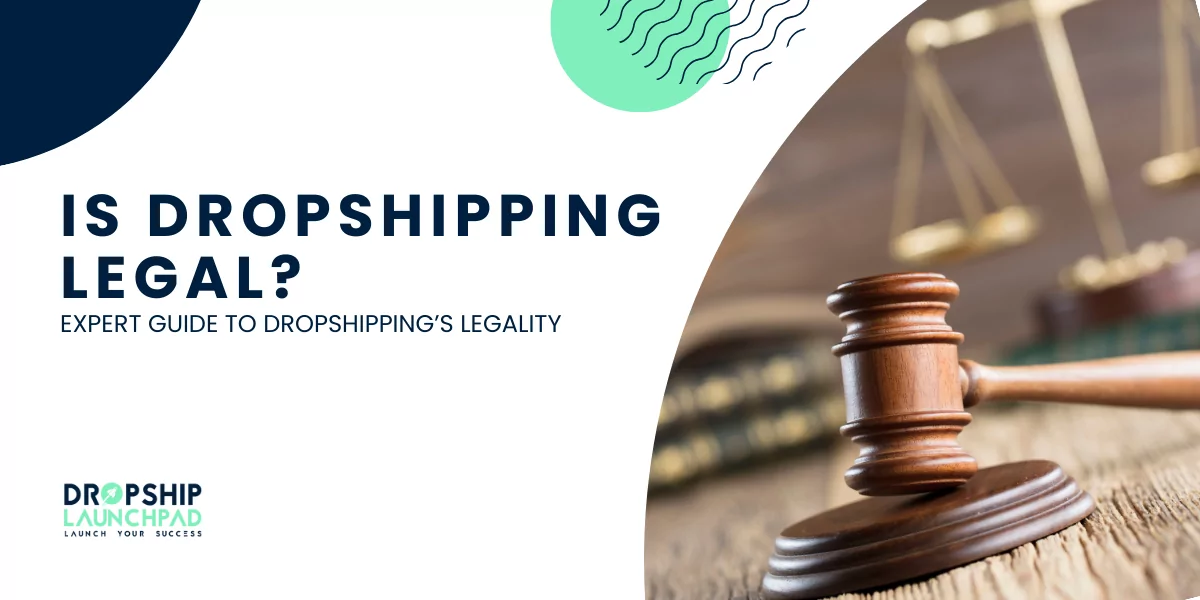Is dropshipping legal? How can you ensure that your business is legally sound and compliant? Consider me your legal guide, wielding the gavel of clarity. In the docket today: Dropshipping. We’ll dissect its legality, scrutinize potential legal pitfalls, and deliberate on crucial aspects like licensing, tax obligations, and the intricacies of supplier relationships.
From the jurisdictional battlegrounds to the ethical high grounds, join me as we unravel the legal tapestry that shrouds the world of Dropshipping. Brace yourselves, for in the chambers of legality, we decipher the truth.
What is Dropshipping?

Dropshipping is a fulfillment method in which online retailers (dropshippers) don’t keep goods in stock. Instead, when they receive an order from a customer, they purchase the item directly from a third-party supplier (usually a manufacturer or wholesaler) who then ships it now to the customer’s doorstep. Dropshippers act as intermediaries, handling the business’s marketing, selling, and customer service aspects.
Importance of Understanding Dropshipping’s Legality

Operating a dropshipping business without a clear understanding of its legality can lead to potential legal pitfalls that may jeopardize the success of your venture. Here are some reasons why it is crucial to familiarize yourself with dropshipping’s legality:
- Legal Compliance: Ensuring legal compliance in dropshipping is crucial for business operations. This includes complying with consumer protection regulations, intellectual property laws, and tax obligations.
- Risk Mitigation: Dropshipping involves various risks, such as product quality issues, delivery delays, and customer disputes. Understanding the legalities can help mitigate these risks and establish procedures to safeguard your business from potential liabilities.
- Building Trust: Operating a legal dropshipping business enhances your credibility and builds trust with both suppliers and customers. It demonstrates your commitment to ethical business practices and protects your reputation in the long run.
- Competitive Advantage: Being aware of dropshipping’s legal landscape allows you to differentiate yourself from competitors who may not comply with legal requirements. Customers are increasingly conscious of supporting businesses that operate ethically and legally.
- Expanding Internationally: If you plan to expand your dropshipping business internationally, understanding the legal requirements of different countries is crucial. Each jurisdiction may have its regulations, and failure to comply can lead to legal consequences.
It is essential to consistently stay updated with legal developments and seek professional advice to ensure your dropshipping business complies with the law.
Is Dropshipping Legal?

Yes. The legality of dropshipping as a business model is often a concern for entrepreneurs considering this approach. The good news is that dropshipping itself is entirely legal in most countries. It is a legitimate business model used by many successful entrepreneurs worldwide.
Ensuring compliance with laws and regulations is of utmost importance for dropshipping businesses. These regulations may cover various aspects such as product quality, labeling, consumer protection, tax requirements, and more. Researching and understanding these regulations to ensure compliance and avoid potential legal issues is crucial.
It is important to also take into consideration the issue of intellectual property rights. It would help if you did not infringe on trademarks, copyrights, or patents when selling products through dropshipping. Using unauthorized logos, brand names, or copyrighted materials without permission can lead to legal repercussions.
For instance, Fakespot, a consumer protection software company, identified 25,000 fraudulent Shopify stores out of the 124,000 stores analyzed. These stores were involved in deceptive practices, including selling counterfeit products, unauthorized disclosure of customer data, and purchasing fake reviews. Notably, approximately 72% of these implicated stores were employing dropshipping strategies.
Key Legal Considerations and Compliance Requirements in Dropshipping

Dropshipping is a legitimate business model used worldwide by entrepreneurs. However, it is essential to understand and comply with the laws and regulations specific to your location to ensure a legally compliant operation.
Licensing and Permits Needed for Dropshipping
When starting a dropshipping business, it is crucial to research and obtain any necessary licenses and permits required by your jurisdiction. These requirements may vary depending on the type of products you are selling and your location. Some products, such as firearms or certain health supplements, may require additional permits or certifications.
- Consult Local Authorities: It is advisable to consult with local authorities or legal professionals to understand the specific licensing requirements for your dropshipping business, ensuring compliance with local laws and regulations.
- Obtain Necessary Licenses: By obtaining the necessary licenses and permits, you can operate your business within the law, reducing the risk of legal issues and establishing a solid legal foundation for your dropshipping venture.
- Avoid Potential Legal Issues: Understanding and adhering to licensing requirements helps your business avoid legal complications, ensuring smooth operations and fostering a trustworthy reputation.
Tax Obligations for Dropshipping Businesses
As a drop shipper, you must understand and fulfill your tax obligations. This includes registering for relevant taxes, such as sales tax or value-added tax (VAT), and remitting these taxes to the appropriate authorities.
- Research and Compliance: The tax requirements for dropshipping businesses can vary, so it is essential to research and comply with tax laws and regulations in each jurisdiction to avoid penalties or legal ramifications.
- Consult with Tax Professionals: Consulting with a tax professional or accountant specializing in e-commerce and dropshipping can ensure accurate and efficient compliance with tax obligations, providing expert guidance tailored to your business.
- Location-Specific Considerations: Factors such as your location, supplier locations, and customer destinations influence tax obligations, making it crucial to consider these factors to meet your responsibilities accurately.
Shipping Regulations and Customs Requirements for Dropshipping
You must understand and comply with shipping regulations and customs requirements when operating a dropshipping business. These regulations govern the import and export of goods and vary from country to country.
- Compliance with Restricted Items: Ensure that the products you dropship comply with any restricted or prohibited items listed in the destination country, preventing legal issues and facilitating smooth customs clearance.
- Partnership with Reputable Suppliers: Partnering with reputable suppliers and shipping carriers is critical to correctly packaging and labeling products, reducing the risk of non-compliance with shipping regulations and customs requirements.
- Consulting with Experts: Consulting with customs experts or shipping agents provides valuable guidance on navigating shipping regulations, ensuring your dropshipping business operates within legal parameters.
Data Privacy and Security Laws and Regulations
As a drop shipper, you may collect and store personal data from your customers, such as names, addresses, and payment information. To safeguard sensitive data, stop data breaches, and stop other security incidents, compliance with data privacy and security regulations is essential. Therefore, it is important to prioritize data privacy and security to prevent any potential harm to individuals or organizations.
- Familiarize with Data Protection Laws: Familiarize yourself with data protection laws in your jurisdiction, understanding the legal requirements for protecting customer data from unauthorized access or breaches.
- Implement Robust Security Measures: Implementing secure payment gateways and encryption protocols is crucial for protecting customer data and complying with data privacy regulations.
- Building Customer Trust: By ensuring compliance with data privacy and security regulations, your dropshipping business can build customer trust and avoid legal consequences related to data breaches or privacy violations.
Dropshipping presents entrepreneurs with a low-risk option for launching an online store; it is a valid and lawful business model. However, it is essential to understand and comply with the laws and regulations specific to your location.
This includes obtaining licenses and permits, fulfilling tax obligations, complying with shipping regulations and customs requirements, and safeguarding customer data according to data privacy and security laws. By operating your dropshipping business ethically and compliantly, you can enjoy the benefits of this business model while avoiding legal complications.
Potential Legal Risks in Dropshipping

Dropshipping has become more well-liked as a low-risk business strategy for those wishing to launch an internet store. However, being aware of potential legal issues during dropshipping is important. Drop shippers can protect their business and ensure compliance by understanding and addressing these legal risks. Here, we will examine some common legal risks in dropshipping and provide tips to minimize them.
Examining Jurisdiction and Legal Compliance in Dropshipping
- Risk Analysis: Inadequate understanding of jurisdiction-specific laws poses a risk of legal complications, fines, and business suspension.
- Risk Mitigation: Conduct thorough research and legal consultations to ensure compliance, avoid legal pitfalls and maintain business continuity.
Consumer Protection Regulations in Dropshipping

- Risk Analysis: Providing inaccurate product descriptions poses legal risks and may lead to violations of consumer protection regulations, impacting customer trust and satisfaction.
- Risk Mitigation: Ensure accurate product information, communicate clearly, and establish efficient complaint resolution processes to minimize legal risks and enhance customer satisfaction.
Avoiding Copyright and Intellectual Property Infringement
- Risk Analysis Failure to perform due diligence in product sourcing can lead to intellectual property infringement, resulting in legal consequences and damage to business integrity.
- Risk Mitigation: Implement strict sourcing protocols, secure authorization for product usage, and regularly audit suppliers to minimize the risk of intellectual property infringement and legal disputes.
Navigating International Trade Laws and Customs Regulations in Dropshipping

- Risk Analysis: Inadequate understanding of import rules and customs regulations in both the source and destination countries poses legal risks for international drop shippers.
- Risk Mitigation: Collaborate with experienced shipping agents, stay informed about international trade laws, and conduct regular compliance audits to mitigate legal risks and ensure smooth cross-border operations.
Transparent and Ethical Business Practices in Dropshipping
- Risk Analysis: Lack of transparent disclosure of information, such as shipping times and return policies, may lead to legal disputes and violations of consumer protection laws.
- Risk Mitigation: Communicate business policies, uphold transparency in all dealings, and invest in robust communication strategies to mitigate legal risks and maintain accountability.
Deceptive Advertising and False Claims in Dropshipping
- Risk Analysis: Engaging in deceptive advertising practices, such as false claims, may lead to legal consequences and damage the drop shipper’s reputation.
- Risk Mitigation: Adhere to ethical advertising standards, conduct regular compliance reviews, and prioritize honest communication to reduce legal risks and build a positive brand image.
Contractual Agreements and Supplier Relationships
- Risk Analysis: Ambiguous supplier agreements may lead to misunderstandings and potential legal disputes in dropshipping.
- Risk Mitigation: Clearly define contract terms, roles, and dispute resolution mechanisms to avoid misunderstandings and minimize legal risks.
Tips to Minimize Legal Risks and Issues in Dropshipping
While dropshipping may have potential legal risks, there are steps drop shippers can take to minimize these risks:
- Research and Stay Informed: Keep up-to-date with local laws and regulations related to dropshipping and e-commerce. Regularly review changes and updates to ensure compliance.
- Work with Reputable Suppliers: Partner with reliable suppliers who have a good reputation and ensure that their products do not infringe any copyrights or trademarks.
- Implement Clear Policies: Clearly outline terms and conditions, refund policies, shipping information, and product warranties to avoid confusion and potential legal disputes.
- Secure Customer Data: Adhere to data privacy laws by implementing appropriate security measures to protect customer information from unauthorized access or breaches.
- Keep Detailed Records: It is important to ensure that all records of transactions, customer communications, and product information are accurate and well-organized. This can help maintain the quality of service provided to customers and make informed business decisions. This documentation can be valuable in case of any legal disputes.
- Consult Legal Professionals: When in doubt, consult with legal professionals specializing in e-commerce and dropshipping. They can provide guidance tailored to your jurisdiction and help you navigate potential legal issues.
By being aware of potential legal issues that can arise during their operations, following these tips, and conducting business ethically, drop shippers can minimize legal risks and build a successful and compliant drop shipping operation. It is important to promptly handle potential legal issues in order to safeguard your business and maintain a positive image.
Can you dropship any product?

While dropshipping offers flexibility in your products, certain items may be restricted or prohibited. Researching and understanding the regulations surrounding the products you intend to dropship is essential. Some common restrictions include:
- Restricted Products: Certain products, such as firearms, pharmaceuticals, alcohol, and tobacco, may be subject to strict regulations or require special sales licenses. It is essential to ensure that you comply with the relevant laws and obtain any necessary permits or certifications.
- Trademarked or Branded Products: Selling trademarked or branded products without authorization can lead to legal consequences. It is crucial to obtain proper licensing or authorization from the brand owner before selling their products.
- Import and Export Regulations: If you plan on dropshipping products internationally, you must familiarize yourself with import and export regulations in both your country and the destination country. Non-compliance with these regulations can result in seized goods and legal penalties.
- Perishable or Hazardous Goods: Shipping perishable or hazardous goods may require compliance with specific packaging, labeling, and transportation regulations. Ensure you understand and adhere to these requirements to avoid legal issues and protect customers’ safety.
- Intellectual Property Considerations: Selling products that infringe on intellectual property rights, such as counterfeit goods or unauthorized replicas, can lead to legal repercussions. It is essential to research the origin and legitimacy of the products you source to avoid infringing on intellectual property.
Is Dropshipping on Amazon Legal?

Many entrepreneurs are drawn to drop shipping on Amazon due to its large customer base and potential for profitability. However, it is important to understand the legality of dropshipping on Amazon before diving in.
The practice of dropshipping is legal. When a customer places an order with an online retailer, the item is shipped directly from the manufacturer or wholesaler to the customer. However, dropshipping on Amazon comes with rules and regulations that sellers must comply with to ensure legal operation.
Sellers on Amazon must adhere to Amazon’s policies and guidelines. This includes accurately representing products, providing exceptional customer service, and ensuring the quality and authenticity of products. It is essential to abide by these policies. Failure to do so may result in the suspension of your account or even legal repercussions.
Is Dropshipping from eBay Legal?

Like Amazon, dropshipping from eBay is allowed if sellers comply with the platform’s rules and regulations. Sellers must accurately describe the products they are selling and deliver them promptly. They must also handle customer inquiries and complaints promptly and professionally.
It is important to note that selling counterfeit or infringing products on eBay is illegal and can lead to severe consequences. Sellers should always ensure that the products they are dropshipping are genuine and comply with intellectual property laws.
FAQs on Is Dropshipping Legal?

Is there any risk in dropshipping?
Yes, dropshipping carries inherent risks. One primary concern is product quality and fulfillment issues, as you rely on suppliers to handle inventory and shipping. Additionally, there’s the risk of oversaturation in specific niches, fierce competition, and fluctuating market trends that can impact profitability. External factors like shipping delays and customs issues can also affect customer satisfaction.
Can anyone be a dropshipper?
Theoretically, anyone can start dropshipping, requiring minimal upfront investment and technical knowledge. However, successful dropshipping demands skills in marketing, customer service, and a keen understanding of e-commerce trends. Only some people possess these skills, making sustained success challenging for some.
Is dropshipping business safe?
While dropshipping can be safe, success depends on choosing reliable suppliers, maintaining excellent customer service, and adapting to market changes. Scams, fraudulent suppliers, and unforeseen challenges in the supply chain can pose risks, so due diligence is crucial for a safe and sustainable dropshipping business.
What is the dark side of dropshipping?
The dark side of dropshipping includes unethical practices like selling subpar products, misleading marketing, and exploiting customers. Some drop shippers prioritize quick profits over customer satisfaction, tarnishing the reputation of the business model. Additionally, relying heavily on third-party suppliers can result in losing control over inventory and fulfillment, leading to customer dissatisfaction.
What mistakes to avoid with dropshipping?
Common mistakes in dropshipping include choosing unreliable suppliers, neglecting customer service, underestimating shipping times, and oversaturating popular niches. Inadequate market research, poor website design, and ignoring legal aspects can hinder success. To thrive in dropshipping, meticulous planning, constant learning, and adapting to feedback are essential.
What’s the hardest part of dropshipping?
The most challenging aspects of dropshipping often revolve around customer satisfaction, managing supplier relationships, and staying ahead of market trends. Balancing marketing efforts and keeping up with the ever-changing e-commerce landscape can be demanding. The need for control over inventory and fulfillment logistics also poses difficulties.
What are the pros and cons of dropshipping?
Pros of dropshipping include low startup costs, minimal financial risk, and the ability to work from anywhere. However, cons have thin profit margins, dependency on third-party suppliers, and potential quality control issues. Competition can be fierce, and marketing challenges may arise due to a lack of control over product availability and shipping times.
Why is dropshipping immoral?
Dropshipping itself is not inherently immoral, but ethical concerns may arise when sellers engage in deceptive practices, such as selling substandard products or misleading marketing. Some argue that dropshipping prioritizes profit over customer satisfaction, potentially eroding accountability and trust. However, ethical considerations ultimately depend on the individual practices of the drop shipper.
Conclusion
In the grand courtroom of e-commerce, the verdict resounds: Dropshipping, when conducted within legal confines, stands as a legitimate and prosperous venture. From licensing intricacies to international trade laws, we’ve scrutinized every facet.
Consumer protection, intellectual property, and transparent practices form the bedrock of a legally resilient Dropshipping empire. As you traverse the entrepreneurial landscape, remember: the strength of your business lies in its unwavering commitment to legal standards.
Craft a realm where every transaction echoes your dedication to lawfulness. In Dropshipping, as in any legal arena, success tips in favor of those who navigate the path of justice and compliance. The scales of e-commerce justice await your conscientious hand.

 Shopify Dropshipping: 2024’s Ultimate Key Insights
Shopify Dropshipping: 2024’s Ultimate Key Insights  What is Shopify Dropshipping: E-Commerce Solution in 2024
What is Shopify Dropshipping: E-Commerce Solution in 2024  How to Dropship on Shopify: 2024 Ultimate Success Playbook
How to Dropship on Shopify: 2024 Ultimate Success Playbook  Top Shopify Dropshipping Suppliers: 12 Best Partners in 2024
Top Shopify Dropshipping Suppliers: 12 Best Partners in 2024